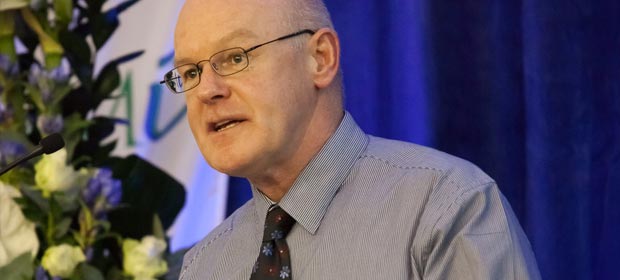The HSE wants to change the notion that all roads lead to hospital emergency departments and to let people know that there are alternatives for patients who might otherwise find themselves waiting for long period in EDs, Mr. John Hennessy, HSE National Director Primary Care told the HMI Dublin Mid Leinster Regional Forum in the Dublin Dental Hospital last week. Maureen Browne reports.

He said we needed to persuade the public and clinicians that alternatives were there and that they could be effective in releasing much activity from Hospitals to Primary Care.
“The objective is a more balanced overall health service. At the minute it would appear that services are overly skewed towards specialist delivery, particularly in acute hospitals. We need to strengthen primary care to achieve this objective of a well integrated and well aligned service with a better sense of balance.
“The core objective centrea on stronger primary care services that are safe and of the highest quality, are responsive and accessible to patients and clients, are efficient and represent good value for money and are well integrated and aligned with the relevant specialist services. “
At the minute it would appear that services are overly skewed towards specialist delivery, particularly in acute hospitals.
Mr. Hennessy said the primary care budget for 2016 was €3.6 billion, an increase of 6.5% on the 2015 budget and an increase of approx 2.5% -3% on the 2015 outturn.
It was noted that a further €13.5 million is held by the Department for enhanced access to GP care in 2016, a further €11 million is included in Mental Health and Social Care for Primary Care services in 2016 and further funds are in the Clinical Programmes for specific Primary Care initiatives in 2016.
He said the Primary Care Division managed the following services – Primary Care Services & General Practice Social Inclusion services (addiction, homelessness, ethnic minorities etc), Oral Health, Primary Care Reimbursement Service (Medical Card Scheme, GP Visit Cards, Drug Payment Scheme, Long Term Illness Scheme, High Tech Drugs etc), Medicines Management, Palliative Care, Civil Registration and Children First Compliance.
There were over 10,000 WTEs employed directly in the service plus approximately 7,000 contracted staff, mainly GPs, pharmacists and dentists, who delivered services to the entire population annually.
For example, activity for the coming year included: 24,000 CIT patient referrals, 1 million GP out of hours contacts, 1 million therapy treatments in primary care, 22,000 orthodontic patients in treatment, 9,500 opioid substitution treatments, 3,600 patients in palliative care and over 2 million medical card and GP visit card holders covered.
The primary care budget for 2016 was €3.6 billion, an increase of 6.5% on the 2015 budget and an increase of approx. 2.5% -3% on the 2015 outturn.
Community intervention teams were now operating in 11 sites and it was estimated that they would care for 24,000 patients this year.
Mr. Hennessy said that key developments this year included:
- Expansion of Community Intervention Team activity – this had been prioritised in line with the work of the ED Task Force
- Improved access to Diagnostics and Minor Surgery in Primary Care – ultrasound was now being provided in nine sites and was being expanded in 2016, and the target was to have minor surgery available in up to 80 centres by the end of the year.
- Extended Chronic Illness management in Primary Care – we wanted to put a structured care programme in primary care for chronically ill patients, delivered by GPs along with senior nurses, practice nurses and CITs, as opposed to being managed in outpatients or in acute hospitals. The objective was to keep chronically ill patients as well as possible and out of hospital.
- Improved access to Therapy Services – especially Speech & Language Therapy.
- Targeted services for Homeless and the Traveller community
- Extended access to Free GP care, GP out of hours services and supports for Rural GPs
- Development of primary care psychology services
- An integrated response to relieve pressure in EDs, incorporating hospital avoidance and facilitating early discharge.
- Strengthened delivery of the Hepatitis C treatment programme.
- An Orthodontic waiting list Initiative.
- Consultant and Clinical Nurse Specialist appointments in Palliative Care and additional Specialist beds in Kerry and Galway.
- The introduction of IHI and Children First compliance.
- Restructured provision of GP training.
- 17 new Primary Care Centres operational.
Mr. Hennessy said a total of €30 million had been allocated to the HepC Programme last year and again this year. Treatment was provided for 450 people last year and it was hoped to increase this in 2016 as the price of the medication, which was now producing remarkable results in terms of curative therapy – came down.
“We have a further 23 primary care centres in development with 17 scheduled to become operational this year.
Mr. Hennessy said manpower planning was becoming a significant issue in Primary Care. We did not have sufficient GPs or public health nurses, and we were short of therapists and other specialist staff.
Further developments were scheduled in relation to technology. By the end of this year the majority of GPs would have access to e-referral and e-prescribing. “The health identifier will also allow us to capture a more accurate picture of service utilisation, noting that many patients have multiple attendances at various parts of the health service each year”.
His concluding message was that we needed:
- A more integrated care approach – and more balance.
- Reduced reliance on hospitals and a transfer of more activity to primary care.
- Strengthened primary care infrastructure and targeted action to address access problems.
- More focus on Safety and Quality.
- Improved productivity/cost control.
- A targeted approach to vulnerable groups.
- Greater use technology as an enabler of integration and efficiency.
- More engagement in staff development and manpower planning.

